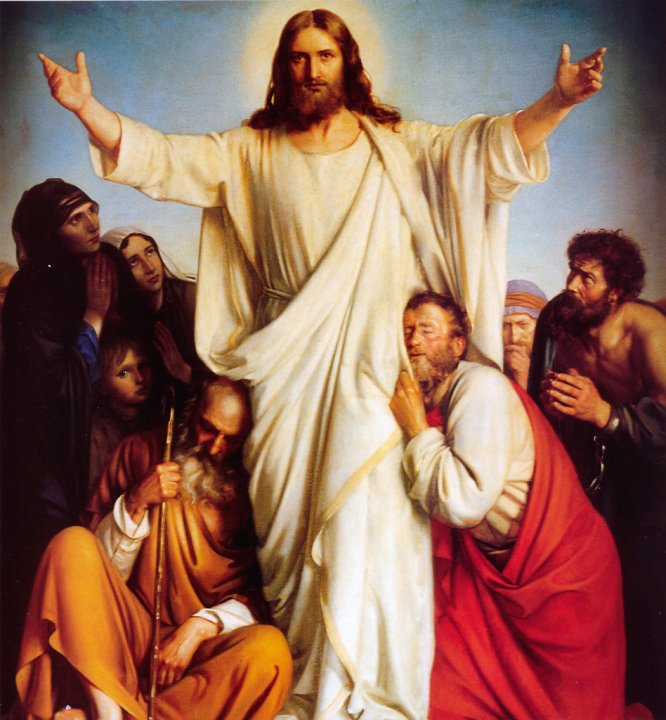All Saints Day, 1st November
I Reading: Revelation
7:2-4,9-14:
II Reading: 1John 3:1-3:
Gospel: Matthew 5:1-12:
In
the year, 609, Pope Boniface IV cleared out the statues of gods and goddesses
from the Pantheon (“the house of all
the gods) which was propagated by the Roman empire and turned the building into
a church which he dedicated to God in
honour of the Blessed Virgin Mary and of all saints. This church is still
standing.
Famous
martyrs and saints were venerated in the church on various dates throughout the
world. Today we have millions of saints who are known and unknown to mankind,
but well known to God. The number of saints and martyrs goes on increasing day
after day, this led the church to establish a feast in their honour on 1st
November around 800 A.D. In this feast we praise God for having accomplished
his salvation in so many people.
The
Holy Spirit moved the church to establish this feast for a double purpose:
1)
To praise God for having completed his salvation in so many of our Christian
brothers and sisters throughout world.
2)
To encourage those still living on earth to persevere faithful to Christ
inspite of human weakness, temptation and persecution.
Their
message from heaven today is:
Do not lose discourage;
remember that we were just what you are, weak, and sinful people. Yet we were
saved by God’s power and love. Keep up the struggle; we are here to lend you a
helping hand with our prayer to God. There is a fabulous reward ready for you
too here.
1.
Every Christian is a saint in the making.
Paul
does not hesitate to call his Christians “saints”:
From
Paul…to you all, who are God’s beloved in Rome, called to be saints.” (Rom 1,
1.7; 1Cor 1,1.2; 2Cor 13,12).
In
today’s second reading, John points out why Christians may rightly be called
“saints” while still on earth, inspite of human weakness:
a.
We, Christians are truly God’s children at Baptism (1Jn 3:1).
b.
We are destined to be with God forever and to be like him (1Jn 3:2-3).
We
Christians ought to consider ourselves at all times, “saints in the making”
that is, people striving to become holy.
2.
Neither human weakness nor suffering nor persecution should discourage
Christians from striving after holiness:
The
Book of Revelation teaches us about the sacrificial life and witnessing life of
the people having faith in Jesus.
a)
The first reason why we should not get discouraged is that we have already been
chosen to be saved: Ex 39:30- Consecrated to Yahweh. Ez 9:4-T=Greek “Tau”,
resemble a cross.
b)
Ours is a numerous family; it runs into millions; we should pluck up courage at
the thought that so many of our brothers and sisters are ready to give us a
helping hand:
The
Book of Revelation speaks of 144,000 people assigned by the angel, that is
12,000 from each of the 12 tribes of Israel.
We
all form part of the new people of Israel; those who will, shall be saved (Rom
11:30-32).
c)
Suffering, persecution, difficulties should spur us on to greater faithfulness,
not discourage us:
In
the first reading of John’s vision- saw a large crowd dressed in white tunics
bearing palms in their hands, a symbol of victory during the time of Nero the
Roman emperor. The second Baptism is the shedding of his/her blood for Christ
which cleanses a person from all sin.
d)
The great reward ready for us in heaven ought to encourage us to be faithful to
Christ: Revelation, the last verses of the first reading 7: 15, 17 have been
left out. They beautifully show what our reward in heaven will be like:
3.
Christians are lucky people: Because the kingdom of God belongs to them by
their faith and by their witnessing life for Christ and for his church.
Hence
our weakness stand in the way of our becoming saints, yet we have very reason
to be optimistic that we shall succeed. Suffering, temptation and persecution
should not a hindrance to our salvation. All we have to do, is to walk on earth
with our eyes fixed on the fabulous reward God has in store for us in heaven.
The True Disciple: Who He is and His Reward (The Beatitudes), Mt
5:1-12
The
Beatitudes of our Lord are powerful, holding before the world a descriptive
picture of the true disciple of God. Seldom people have been spoken with so
much meaning in the history of the world.
The
Beatitudes cover the glorious hope and reward the believer can expect, now as
well as in eternity.
1.
Jesus saw crowds (v.1-2)
a.
Setting: Mountain
b.
Posture: Set-Ready
c.
Audience: Disciples
d.
Purpose: To teach and prepare
e.
Blessed
2.
The poor in spirit: Given the kingdom of Heaven (v.3)
3.
Those who mourn: Comforted
4.
The meek: Inherit the earth (v.5)
5.
Those who hunger and thirst for righteousness: Filled (v.6)
6.
The merciful: Obtain mercy (v.7)
7.
The pure in heart: See God (v. 8)
8.
The peacemakers: Called the children of God (v.9)
9.
The persecuted: Given the kingdom of Heaven (v.10-12)
a.
The persecution
1) Reviled and insulted
2) Slandered and lied against
3) Persecuted and hurt
b.
The behaviour expected: Joy
c.
The reason for joy
1) Great reward
2) Great examples: The prophets
Thought:
Being filled means “to be filled with the Spirit” or “to be led by the Spirit”
(Eph 5:18). “The fruit of the Spirit is love, joy, peace…”(Gal 5:22-23).
